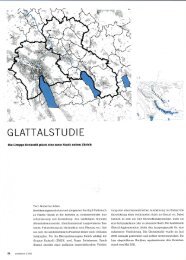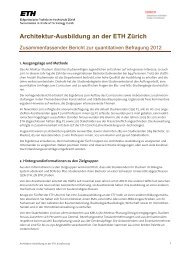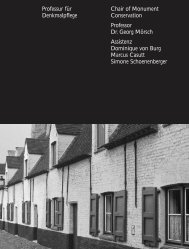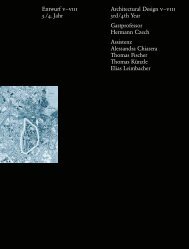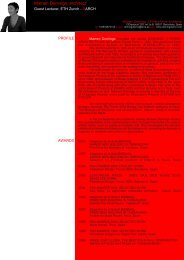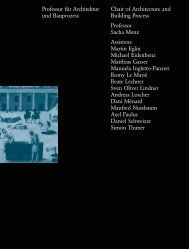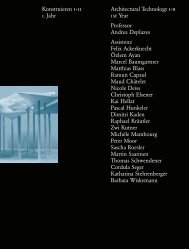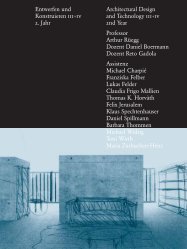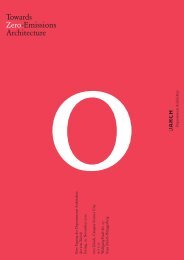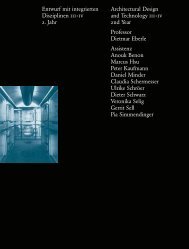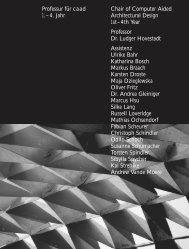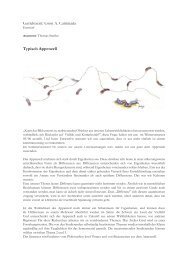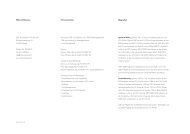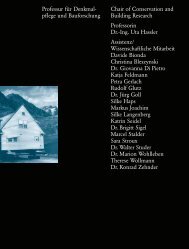Jahrbuch PDF (63MB) - ETH Zurich - ETH Zürich
Jahrbuch PDF (63MB) - ETH Zurich - ETH Zürich
Jahrbuch PDF (63MB) - ETH Zurich - ETH Zürich
Erfolgreiche ePaper selbst erstellen
Machen Sie aus Ihren PDF Publikationen ein blätterbares Flipbook mit unserer einzigartigen Google optimierten e-Paper Software.
Christian Schmid, Christina Schumacher<br />
Lehrbeauftragte Departement Architektur<br />
Dozent/ Dozentin<br />
Dr. Christian Schmid<br />
Christina Schumacher<br />
Website<br />
www.soziologie.arch.<br />
ethz.ch<br />
Soziologie Sociology<br />
Airolo in Transizione<br />
Airolo ist ein Dorf in der Gotthardregion mit rund 1600<br />
Einwohnern. Es liegt in der oberen Leventina, mitten<br />
in der vom eth Studio Basel identifizierten «Alpinen<br />
Brache». Dieser Begriff, der in der letzten Zeit zu grossen<br />
Diskussionen führte, bezeichnet ein Gebiet, das durch<br />
fortlaufende Abwanderungsphänomene und einen Verlust<br />
an Initiative und sozialer Innovationskraft geprägt ist.<br />
Hier ist ein Projekt situiert, das soziologische Analysen<br />
und Kunstinterventionen zusammenführte: In<br />
einem Blockseminar, das von der Dozentur Soziologie<br />
(Christian Schmid und Cordula Püstow) gemeinsam<br />
mit dem Studienbereich «Bildende Kunst» der Zürcher<br />
Hochschule der Künste (Dagmar Reichert und<br />
Franziska Koch) im Sommer 2007 durchgeführt wurde,<br />
untersuchten Architektur- und Kunststudierende den Alltag<br />
und die Zukunftsperspektiven der Bewohner und<br />
Bewohnerinnen. In einer öffentlichen Ausstellung präsentierten<br />
sie ihre Ergebnisse in Form von Posters,<br />
Fotos und Installationen in den Schaufenstern entlang der<br />
Hauptstrasse. Die Aktion fand ihren Höhepunkt in der<br />
Veranstaltung «Airolo in Transizione» vom 27. bis 29. Juli,<br />
die mit Konzerten, Workshops und öffentlichen Diskussionen<br />
die lokale Bevölkerung einbezog. In der Nachbearbeitung<br />
entstanden insgesamt fünf Wahlfacharbeiten<br />
in Soziologie. Sie sind zu einer Broschüre zusammengestellt<br />
an der Dozentur Soziologie erhältlich.<br />
In dem Projekt wurde der grundlegende Wandel greifbar,<br />
dem grosse Teile des Alpenraumes heute ausgesetzt<br />
sind: Während Jahrzehnten lebte die Bevölkerung in Airolo<br />
von den sbb, dem Militär und dem Tourismus, der<br />
wegen der Lage des Ortes am Fuss des Gotthardpasses<br />
ohne besondere Anstrengung einen stetigen Strom<br />
von Einkommen generierte. Zusätzlich gab es noch etwas<br />
Industrie sowie die Landwirtschaft. So konnte Airolo<br />
lange ohne einschneidenden sozialen Wandel und ohne<br />
Anpassungsmassnahmen überleben.<br />
In den letzten Jahren hat sich die Situation jedoch<br />
dramatisch verschärft: Seit der Eröffnung des Gotthardtunnels<br />
1980 fährt der Autoverkehr an Airolo vorbei,<br />
und in wenigen Jahren wird der Bahnverkehr im neuen<br />
Gotthardtunnel unter Airolo durchführen. Das Dorf<br />
wird zunehmend abgehängt, es wird zur Peripherie. Hinzu<br />
kommen Abbaumassnahmen beim Militär und den<br />
sbb sowie ein langsamer wirtschaftlicher Niedergang im<br />
Tourismus. Diese veränderte Situation hat gerade auch<br />
im Alltagsleben deutliche Spuren hinterlassen: Wie sich<br />
zeigte, pendelt die Stimmung im Dorf zwischen vagen<br />
Hoffnungen und Resignation.<br />
Die Bewohner haben der veränderten Situation wenig<br />
entgegenzusetzen. Auch Projekte von aussen konnten<br />
die dringend benötigten Impulse bis heute nicht bringen.<br />
Ein grosses Tourismusprojekt scheiterte und erst seit<br />
kurzem bestehen Initiativen zu einer verstärkten Kooperation<br />
innerhalb der Gotthardregion. So bleiben die<br />
kleinen Projekte, die vor allem auf eine Verbesserung<br />
des Alltags der Bewohner und einen sanften Tourismus<br />
zielen.<br />
244<br />
Airolo in Transition<br />
Airolo is a village of roughly 1600 inhabitants located in<br />
the southern part of the St. Gotthard region. It is<br />
situated along the Leventina valley in the middle of an<br />
area designated as ‘alpine fallow land’ by the eth Studio<br />
Basel. A frequent topic of discussion at present, this<br />
term signifies a region characterized by ongoing emigration,<br />
lacking initiative and social energy.<br />
In the summer of 2007, Airolo’s current situation<br />
became the focus of a project incorporating sociological<br />
analyses and art interventions. In a workshop organized<br />
by the Sociology Lectureship (Christian Schmid<br />
and Cordula Püstow) and the Fine Arts Department at<br />
the <strong>Zurich</strong> University of the Arts (ZHdK) (Dagmar<br />
Reichert and Franziska Koch), architecture and art students<br />
collectively studied and analyzed everyday life<br />
in Airolo and the future prospects of its inhabitants. They<br />
presented their findings in a public exhibition of posters,<br />
photos and installations, which were displayed in store<br />
front windows along the main street. The exhibition culminated<br />
in ‘Airolo in Transizione’, a three-day public<br />
event held from July 27–29, which engaged local residents<br />
in a series of concerts, workshops and public discussions.<br />
Five student reports in the field of sociology were produced<br />
in a follow-up phase. They are available in brochure<br />
form from the Sociology Lectureship.<br />
The radical change that large parts of the Alpine regions<br />
are subjected to at present has been made palpable<br />
through the project. For decades, the sbb, military and<br />
tourism provided the population of Airolo with a constant<br />
flow of revenue that came with relative ease, supplemented<br />
by existing industry and agriculture sources.<br />
These circumstances enabled Airolo to sustain its quality<br />
of life for a long time without the need for any important<br />
social changes or adjustment measures.<br />
However, the situation has taken a drastic turn in<br />
recent years: with the opening of the St. Gotthard<br />
Tunnel in 1980, traffic began driving past Airolo; and<br />
when the new St. Gotthard Tunnel opens in a few<br />
years, rail traffic will bypass Airolo altogether. The village,<br />
as a result, will be increasingly cut off and isolated.<br />
Current cutback measures in the military and sbb, as<br />
well as a slow economic decline in tourism, only<br />
compound the problem. The first signs are already visible<br />
in daily life: the mood of residents appears to oscillate<br />
between vague hope and resignation.<br />
There is little the inhabitants can do to counter the<br />
current situation. Externally-initiated projects have<br />
yet to succeed in providing the desperately needed input.<br />
One large tourism project has already failed and initiatives<br />
aimed at a strengthened cooperation within the Gotthard<br />
region have only recently begun to take form. What<br />
remains are the smaller projects which focus primarily<br />
on improving the quality of life for its inhabitants while<br />
also seeking alternative forms of tourism.



